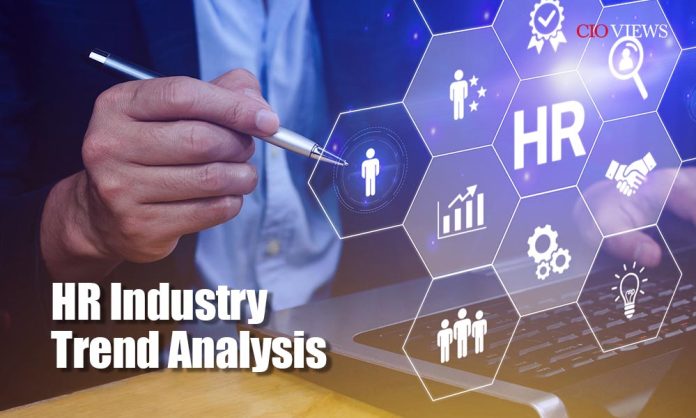The field of human resources is undergoing a transformation. Technological advancements, shifting work models, and a renewed focus on employee well-being are driving these changes. Understanding these trends is crucial for HR professionals aiming to stay relevant and effective in the modern workplace. In this CIO Views Magazine analysis, we explore the key trends shaping the future of HR, HR Industry Trend and how they impact organizational strategies.
The Rise of AI and Automation in HR Industry Trend
Artificial intelligence (AI) and automation are revolutionizing HR processes. These technologies streamline repetitive tasks, such as resume screening and interview scheduling, allowing HR professionals to focus on more strategic activities. AI-powered tools also enhance talent acquisition by identifying the best candidates based on predictive analytics. Furthermore, automation in payroll and benefits administration reduces errors and increases efficiency. As AI continues to evolve, its applications in HR will expand, potentially transforming how organizations manage their workforce.
The Shift Towards Remote and Hybrid Work Models
The COVID-19 pandemic accelerated the adoption of remote and hybrid work models. This shift requires HR to develop new strategies for managing a distributed workforce. Effective communication tools and platforms are essential for maintaining collaboration and productivity. HR must also address challenges related to employee engagement and company culture in a remote setting. Flexible work arrangements can enhance work-life balance, but they require robust policies and support systems to ensure success. The future of work is likely to remain flexible, with HR playing a critical role in navigating this new landscape.
The Importance of Employee Experience and Well-being
Employee experience and well-being are becoming top priorities for organizations. A positive employee experience leads to higher engagement, productivity, and retention. HR initiatives focusing on mental health support, professional development, and work-life balance are essential. Offering personalized benefits and creating an inclusive work environment contribute to overall well-being. Additionally, recognizing and addressing burnout is crucial in today’s fast-paced work environment. HR professionals must continuously evaluate and improve their strategies to enhance the employee experience and support well-being.
The Growing Focus on Diversity, Equity, and Inclusion (DEI)
Diversity, equity, and inclusion (DEI) have gained significant attention in recent years. Organizations are recognizing the value of a diverse workforce and the need for inclusive practices. HR is at the forefront of implementing DEI initiatives, from diverse hiring practices to inclusive training programs. Measuring and tracking DEI metrics helps organizations identify areas for improvement. Creating a culture of belonging where all employees feel valued and included is a key objective. The commitment to DEI is not only a moral imperative but also a strategic advantage in attracting and retaining top talent.
Top 5 HR Industry Trend To Know for 2024
1. AI and Automation Integration
AI and automation continue to transform HR practices. These technologies are streamlining tasks such as resume screening, employee onboarding, and performance evaluations. HR professionals can focus on strategic initiatives while AI handles repetitive processes, leading to increased efficiency and better decision-making.
2. Remote and Hybrid Work Models
The shift towards remote and hybrid work is a lasting trend. HR must develop policies and tools to support a distributed workforce. This includes ensuring effective communication, maintaining engagement, and fostering a sense of community among remote employees.
3. Employee Experience and Well-being
Prioritizing employee experience and well-being is crucial. Organizations are investing in mental health resources, flexible work schedules, and comprehensive benefits packages. A positive work environment enhances productivity and retention.
4. Diversity, Equity, and Inclusion (DEI)
DEI remains a focal point in HR strategies. Companies are committed to creating diverse and inclusive workplaces. Implementing bias-free recruitment processes, conducting inclusive training programs, and tracking DEI metrics are key initiatives.
5. Learning and Development (L&D)
Continuous learning and development are essential for employee growth and organizational success. HR is focusing on creating personalized L&D programs that cater to individual career paths and skill development needs. Online courses, mentoring, and workshops are becoming more prevalent.
The Role of Data Analytics in HR Decision-Making
Data analytics is transforming HR decision-making processes. Leveraging data helps HR professionals make informed decisions regarding recruitment, performance management, and employee retention. Predictive analytics can forecast turnover rates and identify factors contributing to employee satisfaction. HR analytics also play a crucial role in workforce planning and identifying skills gaps. By harnessing the power of data, HR can develop strategies that are both proactive and effective. The integration of analytics into HR practices enhances overall organizational performance.
The future of human resources is being shaped by technology, flexible work models, and a focus on employee well-being and DEI. HR professionals must adapt to these trends to remain effective and strategic partners within their organizations. Embracing AI and automation, supporting remote work, prioritizing employee experience, advancing DEI initiatives, and leveraging data analytics are essential steps. By staying ahead of these trends, HR can drive positive outcomes for both employees and organizations in an ever-evolving landscape.





